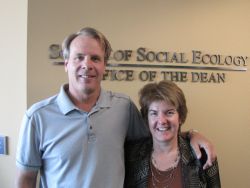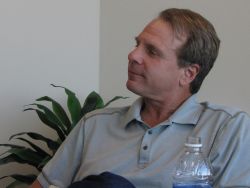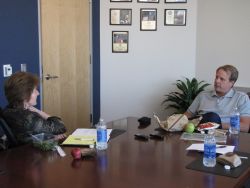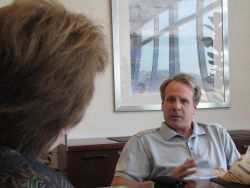Celebrating the passion, dedication and personal stories of Social Ecology faculty, staff, students, alumni and benefactors, “The Dean Asks…” is a feature in which Dean Valerie Jenness interviews people inspired by the pursuit of excellence and encourages participation in interdisciplinary education to solve complex societal problems. Over the next year, please check back to read or listen to additional installments. View Archive
 Valerie Jenness, Dean of the School of Social Ecology, interviewed alumnus Peter Fischler '80 about his memories as a student playing water polo and doing research with Professor Emeritus Gil Geis. Peter explains his career path and the influence UC Irvine had on his direction in life.
Valerie Jenness, Dean of the School of Social Ecology, interviewed alumnus Peter Fischler '80 about his memories as a student playing water polo and doing research with Professor Emeritus Gil Geis. Peter explains his career path and the influence UC Irvine had on his direction in life.
Val: Pete, tell us a little about yourself and your experiences as a Social Ecology student.
Peter: I came to UC Irvine in 1975 as a freshman on a swim scholarship and didn't have a lot of direction in terms of a well-thought out plan on my education or career. Coming to Irvine was a tremendous opportunity to be exposed to the top students from all over the United States, as well as world renowned faculty. Coming from a small suburb in Northern California and attending UCI was very eye-opening. I look back and realize the interactions with the faculty and staff were paramount in setting my goals and direction in life.
Val: When you got here, had you heard of the School of Social Ecology? Did you just stumble into a class or did a friend say, "Why don’t you check out one of those Social Ecology classes?”
Peter: That’s exactly what happened; two of my teammates suggested it. One of my teammate’s father was a professor in Social Ecology - Dr. Arthur Boughey. He taught a class called Limits to Growth. I still remember that class. It talked about the Club of Rome, a group of scientists who had predicted a running out of natural resources based on static projections of consumption versus known quantities that could be obtained. I look back and it's funny because they never took into account technological shifts which are based on consumer demand changes. Therefore, they had predicted oil was going to run out by 1997, and none of it really transpired. We always find a way to shift the goalposts or a different technology comes in and makes something obsolete or it makes acquisition of the existing easier or more cost effective to produce.
Val: You mentioned you arrived here on a swim scholarship, but you also moved over to water polo. Are those the same thing?
Peter: Well, I think things have changed over the decades, but back when I came here, generally most of the water polo team was on the swim team, and vice versa. Over the decades, it's dramatically changed and now people are far more focused on one or the other.
Val: Can you give us a few examples of memorable experiences you had here as an athlete or as a student in the school?
Peter: I think my most memorable experiences were working closely with one of the graduate students who is now a professor here- Dr. Paul Jesilow. He was working on his dissertation under the guidance of Gil Geis, a professor that I greatly admired and took many classes from. Paul entrusted me with a lot of responsibility on his work for the Department of Transportation looking at automobile fraud. In fact it was more than I was comfortable with at the time but Paul encouraged and directed my efforts helping me gain practical experiences outside the campus setting. Later on I was able to directly apply these experiences in my own research work for Professor Geis.
Val: I know you developed both an academic and personal friendship with Gil over the years. What was special about Gil?
Peter: He had an infectious personality. Until I met Gil, in high school and even my first year or two here, I really didn't have that much academic drive. Then, after taking some of his upper division classes, it sparked my intellectual curiosity and really got me much more focused on academics and learning for learning's sake.
Val: I agree with you. I've known Gil for years and, unfortunately, as you know, he passed away last year. But he was a character, and infectious is just the right word to describe him.
Peter: Absolutely. I always looked forward to his classes or a small group seminar with eight other students and just talking with him for an hour and a half.
 Val: Are there any student experiences you had that, maybe at the time, were seemingly uneventful, but looking back has more prominence or meaning?
Val: Are there any student experiences you had that, maybe at the time, were seemingly uneventful, but looking back has more prominence or meaning?
Peter: I remember Gil Geis invited me to his house in Laguna Beach one Saturday afternoon to play ping-pong. Looking back, he was a renowned criminologist known worldwide yet he took the time and the effort to get to know his students. I thought that was very special.
Val: Did you beat him in ping-pong or did he beat you?
Peter: No, he beat me. But I'm pretty sure I could have beaten him in water polo. The experiences I had here on campus really did set the direction that my life took. It was intertwined between academics and athletics. I learned a tremendous amount from the athletic program, the legendary coach Ed Newland, who is a coach emeritus to this day. Newland gave us a value system and helped build our character to a point that I really don’t think that I could have gone on to do the things I did without those interactions and life lessons. The most notable lesson was being able to control your ego. It sounds so basic, but it's so hard for men especially to do. Controlling your ego is critical to being able participate within a team framework whether it's athletics or in the corporate world. It is difficult to control yourself and to not let emotional temperament drive you to answers or doing things that are detrimental to yourself and/or the group.
Val: Tell us what happened with your life after you got your degree? Where did you go? What did you do?
Peter: Ultimately I ended up on Wall Street as a bond trader. This ability to control my ego- to not think I was bigger, smarter, better than the market instead humbly take what the markets offered helped my career longevity. Many traders in the financial markets didn't last due in large part to their inability to control their ego. Social Ecology gave me the foundation for decision-making and basic data analysis. Being able to merge lessons from both athletics and academics really allowed me to become a bond trader and detach myself from the emotions of the market but have the analytical agility to look at hard data and come up with quick decisions. I know that had I not had those experiences and had they not come from here, I would have taken a completely different direction in life.
Val: It's interesting, because I'm hearing you, the image I'm getting is that you picked up a kind of intellectual set of skills in Social Ecology, but you also picked up some lessons about temperament and mindset in athletics.
Peter: Absolutely.
Val: That's very illuminating, how you blend those two sets of acquisitions because those are your acquisitions from UCI. How do you go from that to Wall Street?
Peter: I had always, since the early days here at UC Irvine, had anticipated getting an MBA. During my final year at UCI, I took a leave of absence to play water polo in Australia. When Gil heard about this, he had suggested that I do a cross-cultural research project while in Australia. He arranged with his colleagues at the University of Queensland in Brisbane for me to have access to the resources I needed to conduct research. When I came back I replicated the study at UC Irvine. I was 22 years old and I remember walking around the University of Queensland as if I was a visiting associate of Gil Geis’s, and really I was just another college kid. Because of Gil's far reaching influence and the respect his work received worldwide the faculty and staff at the University treated me like a visiting dignitary. Working with Paul Jesilow greatly prepared me for doing this project and it was ultimately recognized by the UCI Alumni Association when I received the Distinguished Student Scholar award for Social Ecology from them.
Val: What was the question you were trying to answer in your research?
Peter: It was a social attitude towards marijuana usage. This experience of living and doing research in Australia made me rethink getting a domestic MBA. Instead I choose to attend theThunderbird School of Global Management and shifted my focus to an international MBA.
 Val: At that point, was your idea that I'll get an MBA and go to Wall Street or what were you thinking at that point?
Val: At that point, was your idea that I'll get an MBA and go to Wall Street or what were you thinking at that point?
Peter: I did want to go to Wall Street and I wanted to work in the financial markets. Again, this circles back to my experiences at UC Irvine. I had a teammate whose father worked in mortage banking for First Interstate Bank in Los Angeles. He told me when I graduated his father would be happy to set me up with a job interview. I thought he meant a teller job at a small branch somewhere and so I never took him seriously. After graduation I went to NYC and hit the pavement looking for a job. At some point I gave my old teammate a call and within three or four days I ended up on the bond trading desk at First Interstate Bank in Los Angeles. It was a regional bank at the time and I did not know how sophisticated and extensive their operations were. They traded around the world and they had a huge capital markets presence. I did that for a couple of years and got the experience I needed to then be able to go back to New York City and work on Wall Street. I landed a government bond trading job with an old line Investment Bank, now defunct, named Kidder Peabody. The US government spends a lot more money than they take in and they issue bonds to cover the deficit. These government bonds get traded pretty aggressively from the shortest maturities, called T-bills, out to the longest maturity, called a 30-year bond. I was responsible for a certain sector of the yield curve which I traded and we were expected throughout the day to make markets in these specific securities. I did that for about 10 years in New York, London and Tokyo- all with Kidder Peabody.
From the decade of trading those bonds and going through many economic cycles and different periods of political or economic crisis- the analytics are one component of it and the numbers are another part then that intuitive feel for why things are trading relative to each other the way they are becomes kind of second nature.
When Kidder Peabody went out of business, it was an easy transition to go work for one of our customers. I went to a hedge fund in Santa Monica called Coast Asset Management, where I became a customer of Wall Street. The technique that this hedge fund employed is called arbitrage, where we look to buy what we perceive as undervalued bonds relative to a fair value or an expensive bond. Our technique was to buy undervalued bonds and hedge ourselves by shorting a fair value or an expensive bond against it. Then, at some point- hours, days, weeks, months down the road- when the relationship between the two came back in the line the way we had predicted, we would sell what we owned, the undervalued bond, and buyback what we had sold, the fair market or expensive bond. The resulting profitability is the return to our investors.
Val: Was it odd for you to go from the world of Social Ecology and integrative learning to this fast paced world?
Peter: It wasn't. It seemed like a very natural progression, and when I look back over the almost 30 years now that I've done it, I don't feel as if I've worked a day in my career. Stress is an interesting phenomenon, because stress doesn’t mean the same thing to everybody. What you perceive as stressful, the next person just laughs at. It’s really how you handle it that determines whether it's a stressful situation or not. The arbitrage technique took out a lot of the stress of what people perceive as trading, because we never took outright market risk. I never bought securities because I thought the market was going to go up and then waited for it to happen, which is horribly stressful. Instead, looking for these microscopic differences between very similar securities and staying hedged to directional risk suited my temperament far more than trying to outright predict which direction the market was going. Most people ultimately fail in their attempts to predict short term market direction.
Val: That's the lesson from that class that you remember, Limits to Growth. It sounds like the lesson of that class was you can't predict with any degree of certainty, because of all the unknowns. You find a place in the market where it's less stressful for you because you don't have to predict that.
Val: What advice would you give current students?
Peter: First, it's a much more competitive environment now than when I graduated. Students looking to forge a similar career path and to work in the financial services or on Wall Street have a lot more competition for fewer jobs. It doesn't mean that anybody should be discouraged; it means they just have to have realistic expectations about what's out there. My advice is to really set yourself apart from your contemporaries. First off, get to know all the faculty that you possibly can. Whether it's asking questions in class, going to office hours, signing up for volunteer work, or working on a project- whatever it takes. Nobody will make you or ask you to do this. It really has to come from your own volition. Those opportunities are going to help you get the next step up in your career when you leave UC Irvine.
 Val: Pete, you have kind of laid out your student and career trajectory. Are there things that you still hope to accomplish?
Val: Pete, you have kind of laid out your student and career trajectory. Are there things that you still hope to accomplish?
Peter: I was driven, and I sacrificed to achieve the things I did. I didn't consider it a sacrifice at the time. For example, I delayed having a family and getting married until later on in my life. So I am enjoying that now.
I think that I will wind down the bond trading in the next few years. Lately, I've focused a lot more on real estate development and the spec building of single-family homes on the Westside of Los Angeles. I have really enjoyed doing this.
Val: Pete, you are a part of our alumni population on campus and you often give back. Can you give us more of your thoughts about UC Irvine today?
Peter: Well, first off, there's a reason I give back, and that's because there were a number of people along the way in my life and in my career who, for no benefit to themselves, helped me along the way.
I know I had great mentors and people who shaped the direction of my life and career path and I am grateful for them. That is part of the reason I try to give the same opportunity to the younger kids now. As far as the University I couldn’t be more proud having attended UC Irvine, and as the decades have gone on I just get even more amazed at the level of success and the acomplishment the University has achieved.
Val: If someone asked you, “What is Social Ecology and how did it help you?” what would you say?
Peter: Social Ecology will give you exposure to a wide range of subject matter. It is up to you to find the areas that interest you and that you want to pursue. Social Ecology gave me that framework for decision-making and analysis that was instrumental in the path I took and successes I've had along the way. I truly believe it can do the same for you.